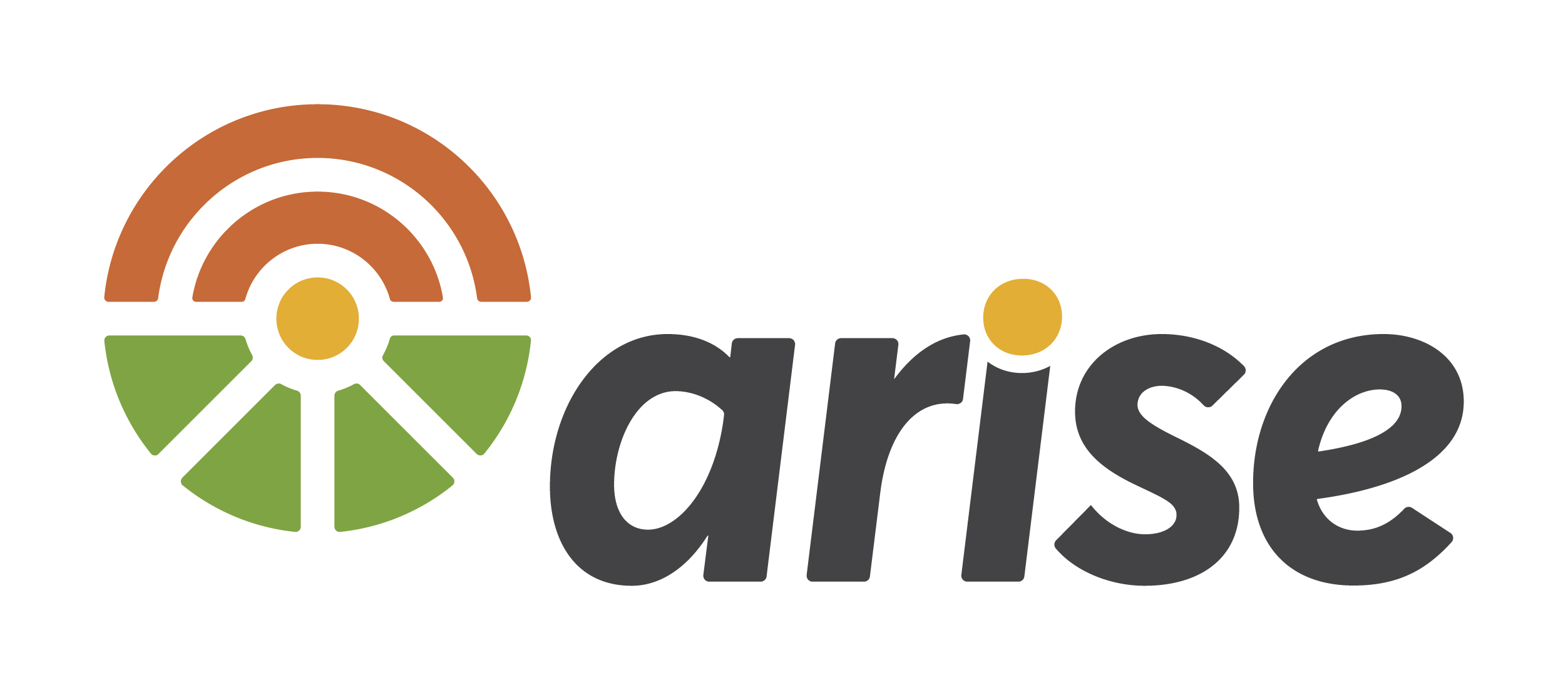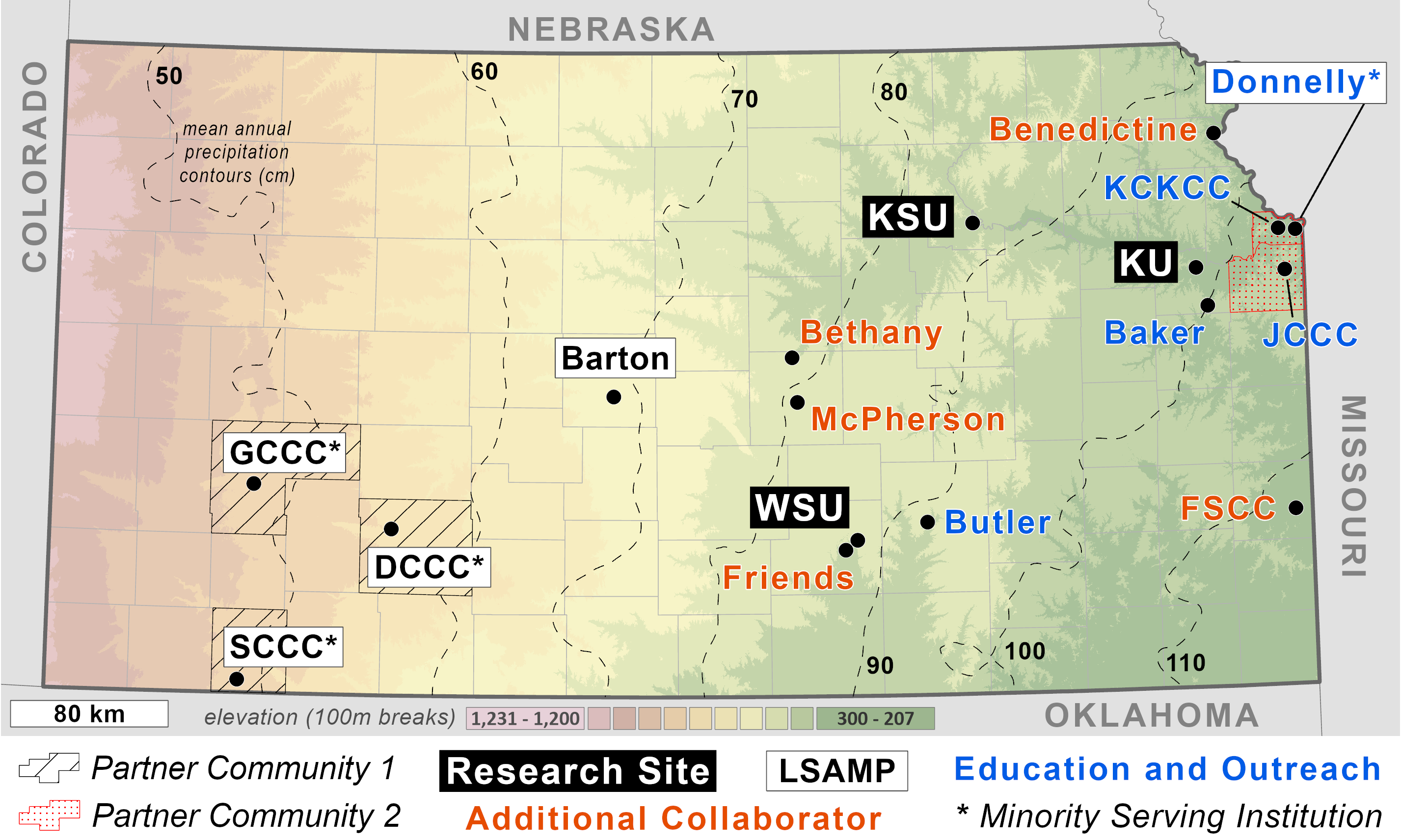Adaptive and Resilient Infrastructures driven by Social Equity
(ARISE)
Kansas NSF EPSCoR RII Track-1

NSF EPSCoR RII Track-1, #2148878 (2022-2027)
Funding Opportunities
Call for proposals now open!
First Award notice of intent due July 31, 2023
REI proposal due August 31, 2023
Award Recipients:
Spring ’23 | Fall ’23 | First Awards
Team Resources
ARISE Team Site (requires login)
Research Sharepoint (requires login)
ARISE KARS Site for Data Access
Education & Outreach Opportunities
Handbook (requires login)
Postdoc & Student Leadership Group | contact: ariseplsg@ksu.edu
Recordings (requires login)
Summer Research
News
E-Newsletters
Project Overview
ARISE is a major investment in Kansas by the U.S. National Science Foundation Established Program to Stimulate Competitive Research (EPSCoR RII Track-1). The ARISE acronym stands for “Adaptive and Resilient Infrastructures driven by Social Equity.”
This statewide initiative seeks to advance the resilience of infrastructures that all Kansans depend on—such as water, energy, and transportation systems—by creating tools that ensure support for our most vulnerable communities in both rural and urban areas. The project will also create a pipeline of community leaders and decision-makers who will transform how a community invests in and manages its human and physical infrastructure.
Rationale
Complex infrastructure systems provide essential services for societal well-being and economic prosperity. These systems enable mobility for humans, goods, and services, and delivery of power, water, and other essential utilities to households and businesses. Natural hazards and attacks on cyber and physical assets have made resilience—the capacity of a system to absorb a disturbance, adapt, and recover rapidly when disruption does occur—an urgent pursuit for critical infrastructure.
Social equity is essential to resilience since the most socially vulnerable people live and work in the most physically vulnerable buildings and areas (e.g., floodplains) with undersized or undermaintained infrastructure. Federal agencies recognize that many disaster recovery efforts are systemically biased against houseless people, persons with disabilities or living in poverty, racial minorities, ethnic and indigenous populations, or renters. These put racial equity, support for underserved communities, and combatting the climate crises at the center of national security.
To help close this fundamental gap in resilience science and engineering, ARISE researchers take a convergence approach by integrating expertise from computer science, economics, engineering, public policy, psychology, and other areas.
Research
Kansas currently ranks 9th in federal disaster declarations per capita. Amid changing climate patterns and frequent extreme weather events, historically underserved communities often receive less aid and recover slower from weather disasters.
ARISE will consider hazard threats in urban and rural regions in Kansas to produce a one-of-a-kind decision-support tool that can enhance disaster resilience in Kansas and beyond. This tool will be co-designed with the help of stakeholder partnerships. It will enable decision-makers to evaluate decision and policy levers with measurable impacts on equity-driven resilience and provide the fundamental steppingstone for Kansas Board of Regents (KBOR) institutions to seek additional federal research funding to transition Kansas to a Smart State as envisioned in the Kansas Science & Technology plan.
The project is framed around four research themes. Theme 1 focuses on understanding equity measurements and interdependent infrastructure systems; Theme 2 develops an evaluation framework; Theme 3 considers four case studies for hypothesis testing; and Theme 4 integrates research into decision-lever case studies and decision support tools.
Education and Outreach
The research agenda is supported by an education program that includes creating an interdisciplinary data-science curriculum, which connects students from 11 institutions to community organizations through a new Kansas Data Science Consortium (KDSC).
In addition, ARISE also supports summer research experiences, partnerships with museums and libraries to engage youth and family in science, and workforce development programs for municipal planners and utility operators.
The project will propel researchers and educators to the forefront of the resilience science and engineering arena, leading to a vibrant, community-centered research and education portfolio that builds research capacity in Kansas.
Statewide Partners
17 universities and colleges are involved in ARISE, including:
- University of Kansas (KU)
- Kansas State University (KSU)
- Wichita State University (WSU)
- Baker University
- Donnelly College (DC)
- Butler Community College
- Johnson County Community College (JCCC)
- Kansas City Kansas Community College (KCKCC)
- Barton Community College
- Dodge City Community College (DCCC)
- Garden City Community College (GCCC)
- Seward County Community College (SCCC)
- Additional collaborating institutions: Benedictine College, Bethany College, Fort Scott Community College, Friends University, and McPherson College.
KU, KSU, and WSU are research-intensive institutions; DC, DCCC, GCCC, and SCCC are Hispanic Serving Institutions.

What is EPSCoR Track-1?
The U.S. National Science Foundation (NSF) Established Program to Stimulate Competitive Research (EPSCoR) uses three investment strategies (called Tracks) to enhance research capacity.
Track-1 initiatives, like ARISE, are major, multi-year investments. Their goal is to build capacity for research in states and territories that receive a lower percentage of federal support. With 20 million dollars from NSF and matching funds from the state, these five-year programs enhance physical, human, and cyberinfrastructure in research areas critical to the specific state or jurisdiction.
Kansas NSF EPSCoR mark its 30th anniversary in 2022 with ARISE as its eighth Track-1 program. In addition to jumpstarting faculty careers with First Awards, for every dollar NSF EPSCoR pumps into research, Kansas gets back more than double that in non-EPSCoR funding for research.

